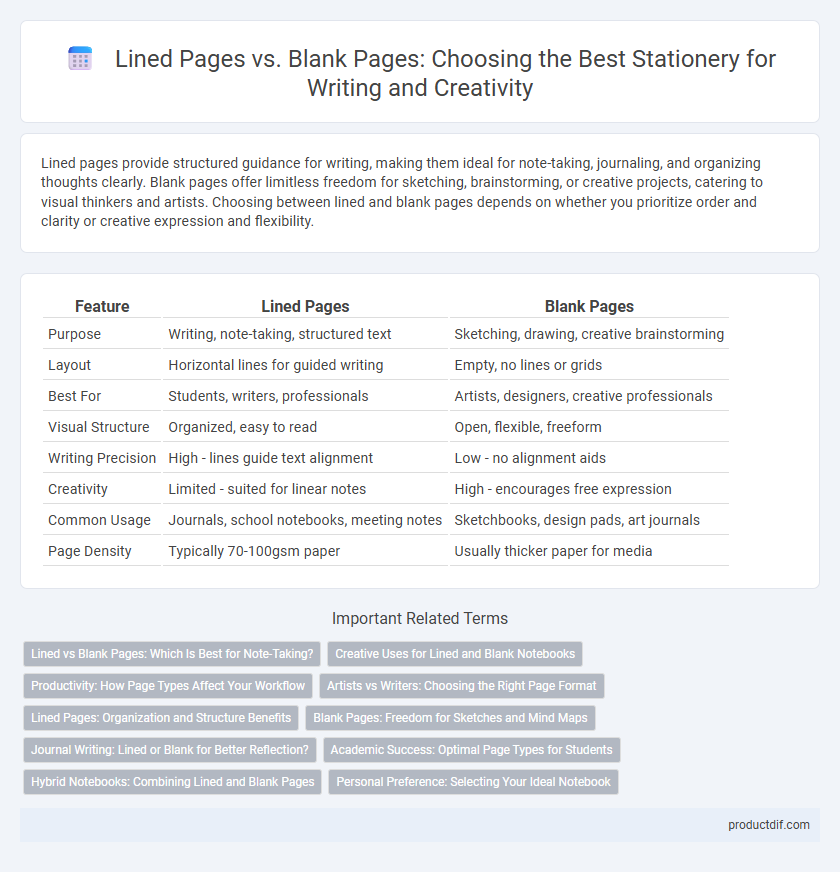Lined pages provide structured guidance for writing, making them ideal for note-taking, journaling, and organizing thoughts clearly. Blank pages offer limitless freedom for sketching, brainstorming, or creative projects, catering to visual thinkers and artists. Choosing between lined and blank pages depends on whether you prioritize order and clarity or creative expression and flexibility.
Table of Comparison
| Feature | Lined Pages | Blank Pages |
|---|---|---|
| Purpose | Writing, note-taking, structured text | Sketching, drawing, creative brainstorming |
| Layout | Horizontal lines for guided writing | Empty, no lines or grids |
| Best For | Students, writers, professionals | Artists, designers, creative professionals |
| Visual Structure | Organized, easy to read | Open, flexible, freeform |
| Writing Precision | High - lines guide text alignment | Low - no alignment aids |
| Creativity | Limited - suited for linear notes | High - encourages free expression |
| Common Usage | Journals, school notebooks, meeting notes | Sketchbooks, design pads, art journals |
| Page Density | Typically 70-100gsm paper | Usually thicker paper for media |
Lined vs Blank Pages: Which Is Best for Note-Taking?
Lined pages provide structured guidance, improving legibility and organization for detailed notes or academic settings. Blank pages offer creative freedom, ideal for sketching, mind maps, and free-form brainstorming without constraints. Choosing between lined and blank pages depends on whether the note-taker prioritizes order and clarity or flexibility and visual expression.
Creative Uses for Lined and Blank Notebooks
Lined notebooks provide structured guidance ideal for writing, journaling, and organizing thoughts, making them perfect for essays, to-do lists, and note-taking. Blank notebooks offer unlimited creative freedom, suited for sketching, mind mapping, and visual brainstorming, enabling artists and designers to explore ideas without constraints. Combining both types enhances productivity by catering to diverse creative processes, from precise writing to freeform artistry.
Productivity: How Page Types Affect Your Workflow
Lined pages enhance productivity by providing structured guidance for writing, helping maintain consistent alignment and improving note-taking efficiency. Blank pages foster creativity and flexibility, ideal for sketching, brainstorming, and freeform thinking without constraints. Choosing the right page type aligns your workflow with task demands, optimizing focus and output quality.
Artists vs Writers: Choosing the Right Page Format
Artists prefer blank pages for unrestricted creativity, allowing freeform sketches and visual brainstorming without guidelines. Writers benefit from lined pages that provide structure for organized thoughts, neat handwriting, and consistent text alignment. Selecting the right page format depends on whether precision in writing or freedom in drawing is the priority.
Lined Pages: Organization and Structure Benefits
Lined pages offer superior organization and structure, making them ideal for note-taking, journaling, and planning by providing consistent guidance for neat, legible writing. The evenly spaced lines help maintain uniformity in text alignment, improving readability and facilitating quick reference. This structured layout supports efficient information management and enhances productivity in academic, professional, and personal settings.
Blank Pages: Freedom for Sketches and Mind Maps
Blank pages in notebooks offer unmatched versatility, fostering creativity for sketches, mind maps, and freeform note-taking. Without predefined lines, users can visually organize ideas, enhance brainstorming, and capture complex thoughts with ease. This freedom makes blank pages ideal for artists, designers, and anyone seeking an open canvas for innovative thinking.
Journal Writing: Lined or Blank for Better Reflection?
Lined pages provide structured guidance for journal writing, promoting clarity and organized thoughts, which is ideal for reflecting on specific events or planning goals. Blank pages encourage creative and free-flowing expression, allowing for sketches, mind maps, or unstructured reflections that foster deeper emotional insight. Choosing between lined or blank pages depends on whether the journaler prefers discipline and order or open, visual exploration for better reflection.
Academic Success: Optimal Page Types for Students
Lined pages enhance academic success by promoting organized note-taking, improving readability and retention through structured writing. Blank pages foster creativity in subjects like art and design, allowing free-form diagrams and mind maps that support visual learning. Students benefit most by selecting page types aligned with their study habits and course requirements, integrating lined pages for precise textual notes and blank pages for brainstorming and problem-solving.
Hybrid Notebooks: Combining Lined and Blank Pages
Hybrid notebooks featuring both lined and blank pages provide versatile options for note-taking and creative expression, accommodating structured writing and freeform sketches within a single notebook. These notebooks optimize productivity by allowing users to alternate between organized, linear notes and uninhibited drawing or brainstorming space. The integration of lined and blank formats enhances flexibility, making hybrid notebooks ideal for students, artists, and professionals seeking multifunctional stationery solutions.
Personal Preference: Selecting Your Ideal Notebook
Choosing between lined pages and blank pages depends on individual writing habits and creative needs. Lined pages provide structure for note-taking, journaling, and organized writing, enhancing legibility and consistency. Blank pages offer freedom for sketches, diagrams, and freeform writing, ideal for artists and thinkers who prefer flexibility in their notebook.
Lined Pages vs Blank Pages Infographic

 productdif.com
productdif.com